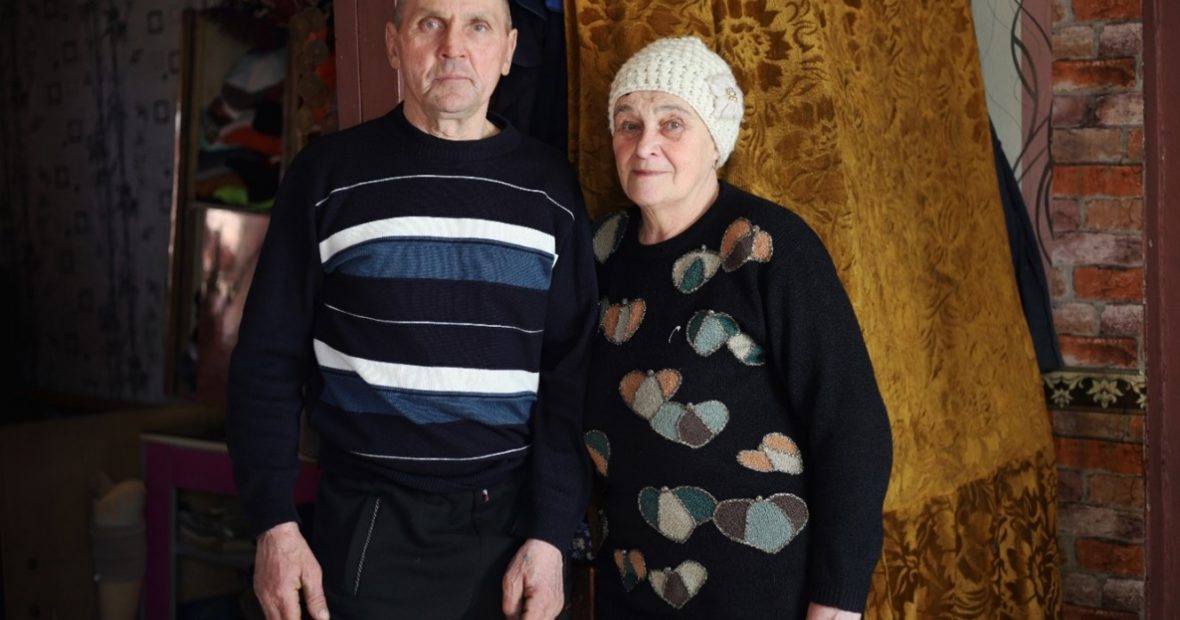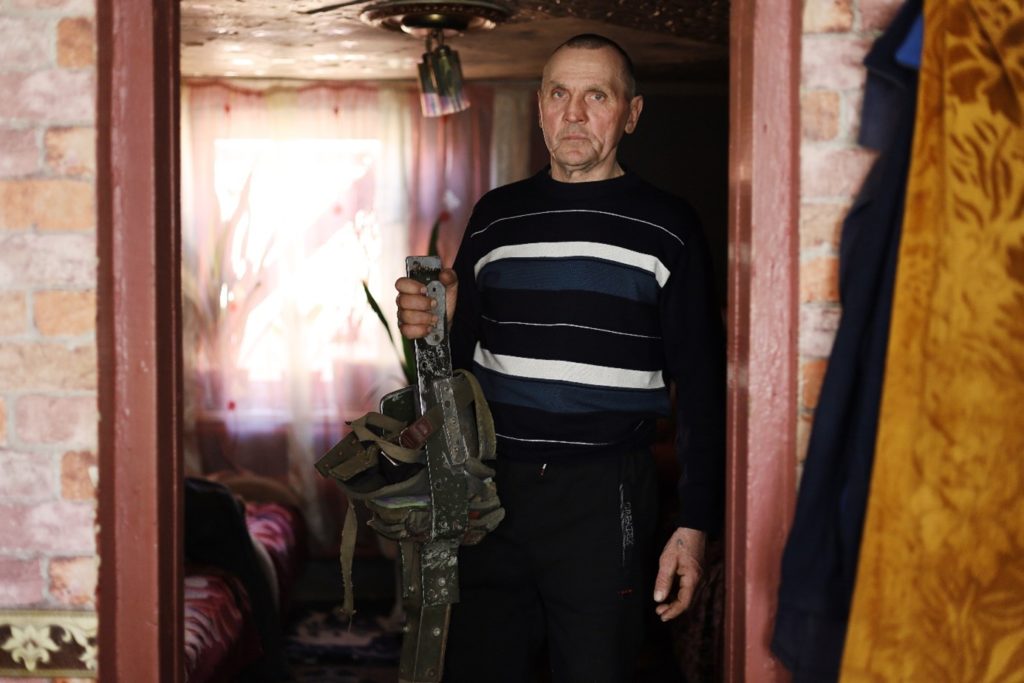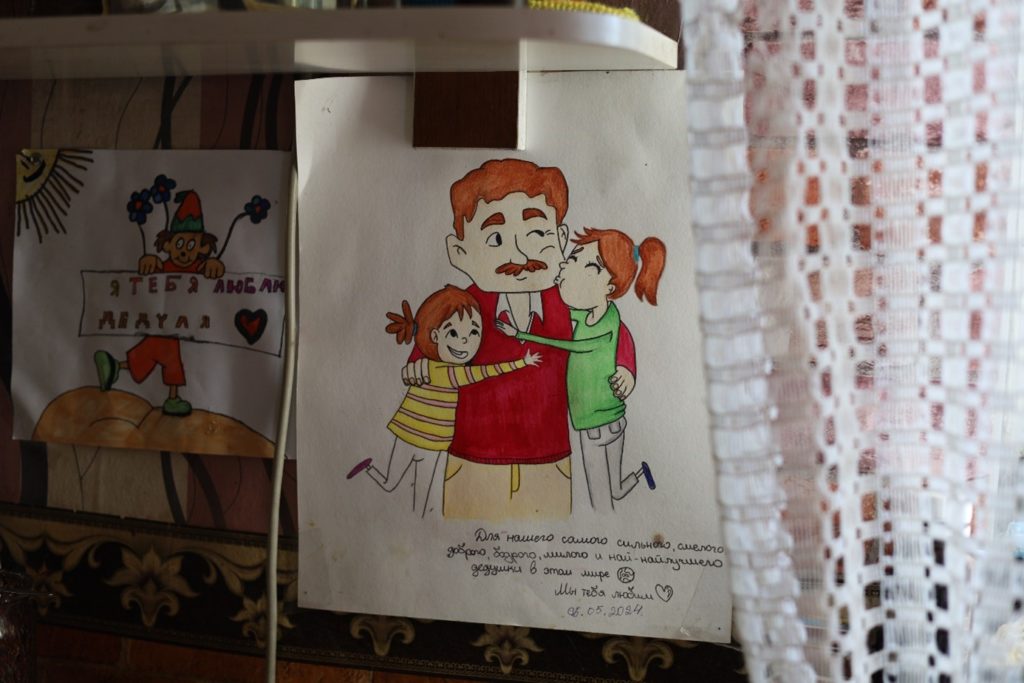Besides the constant shelling, destroyed housing, and food deficit, the civilian population of Ukraine faces another danger every day – weapon contamination. Since the escalation of the armed conflict in 2022, about a thousand people have been injured by unexploded ordnance. As of April 1, 2024, 295 civilians have been killed. Such statistics are provided by the Ministry of Defence of Ukraine.
Over the past year, the ICRC team handed over 160,000 marking materials and equipment to Ukrainian pyrotechnics, notably from the State Emergency Service of Ukraine (SESU). About 300,000 people received information about the risks posed by explosive remnants of war and the behaviours to adopt to stay safe. However, the number of victims continues to increase.
The stories of Maksym and Serhii exemplify the risks that civilians face in Ukraine as a result of weapons contamination. Both benefited from ICRC financial support after they got affected.
Maksym
In November 2022, Mykolaiv region was retaken by Ukrainian armed forces. However, settlements where active hostilities took place remain particularly dangerous for civilians. In 2023, fifty-seven people were injured by mines. And since the beginning of this year, 17 people have already been injured, the main Department of SESU in the Mykolaiv region reported.
According to pyrotechnics, the leading cause of accidents is human unawareness and curiosity. There have been numerous cases of injuries when people returned home after and were injured there.
Twenty-year-old Maksym is a resident of Pavlo-Marianivka village. Almost two years have passed since he lost all his fingers on the left hand. With the escalation of the armed conflict, his village practically became a frontline.
“The neighbouring village across the river was under occupation, and we were in the grey zone and constantly shelled from there. It hit our yards, our neighbours’ yards, one and the other. We had to leave because we couldn’t stay here any longer. The shelling was so intense, everything was flying over our heads,” Maksym says.
Out of half a thousand people, only twenty-four remained in the village. Twice, the boy and his family left and returned home. First, they lived with relatives in Cherkasy for a month, then in another village in Mykolaiv region for six months. He says that although they knew that active hostilities were taking place in the village, they dreamed every day of returning home as soon as possible. When they finally got the news that all the villages nearby were retaken, they returned to their home village of Pavlo-Marianivka. Four days later, Maksym was injured.
“It happened on 24 November of 2022. My friends and I decided to meet after a long time. Everyone was displaced; everyone was escaping. We have a playground there, and we agreed to meet there. In the evening, I was walking and came across an unknown object.”
Maksym thought his cell phone had fallen out of his pocket, but he couldn’t see it because of the darkness. He admits that instead of checking his pocket, he immediately bent down to pick it up.
“As soon as I bent down, I got injured, and my phone was still in my pocket. The explosion blew off the fingers A fragment hit my eye, and for about a week, I had no vision in my eye. Then it came back, but it remained there. They did not get it out. They tried and tried, but no one could get it out. I also have shrapnel in my leg; they are small. Getting them out is very difficult because the whole leg has to be cut. There are a lot of them, about 100 pieces, so it’s better to let them lie there.”
Pyrotechnics who arrived at the scene said it was an explosive machine gun round. His friends and neighbours came running to the sound of the explosion and gave him first aid. They put a tourniquet on his arm, but no one noticed his leg. He lost a lot of blood, but managed to get to the hospital, albeit in a semi-conscious state.
“It was only when we were on the way to the hospital that I saw that there was a hole. And all the way there, I was plugging it with my finger because it was so big, I could fit my finger in there. I was holding it so that the blood would not flow so much. I lost a lot of blood. Even the doctors said it was a lot.”
Maksym’s surgery lasted five hours. The doctors saved his life but could not save his fingers. He spent two months in Mykolaiv hospital and underwent five operations. He says that he was of course shocked at first but came to terms with his loss from the very first day, and reassured himself and his parents because the main thing was that he was alive.
“He’s a great guy. He said, I can handle anything! And he calmed us down the other way around. We cry because we can’t hold it together, and he says everything will be fine! For my father’s sake,” he said, “I’ll bear it!” says Nadiia, Maksim’s grandmother.
Nadiia bandages her grandson’s arm every day. Maksym’s limb is constantly freezing after losing his fingers due to poor blood circulation. She still cannot recall that incident without crying. She regrets that they rushed to return home, although she realizes that the situation cannot be changed.
“What I would change! We cannot stop the war! Maybe it would be better if we stayed in Maliivka, in this cold…” – she starts to cry.
Maksym has no regrets about returning. He says that the main thing is that he is home, and everything else will work out. He is not discouraged: he continued his studies and found a job in his specialty as an auto mechanic. He also celebrated ten months of being with his girlfriend. He does not share what his goals are for the future, saying that he will achieve everything. Just to live at home again, as before, in peace.
Serhii Mykolaiovych
Serhii Mykolaiovych’s once-blue gate, riddled with shrapnel, is the first thing that visitors encounter when they enter Velyka Komyshuvakha village, in Kharkiv region. In the main street, there isn’t a single building untouched by the hostilities: broken roofs, cracks along the walls, and misshapen stone structures where there used to be someone’s home.
Despite the spring, the field cannot be used for agriculture, as local residents used to do. Now, red and white warning tape peppers everything that has spontaneously grown since 2022. The forest, once the pride of the local population, is now spattered with mine risk warning signs. Here, every step can hide unexploded ordnance that puts people in grave danger.
 |
 |
Serhii Mykolaiovych Zhukov is reluctant to recall that day. He only talks about it to warn others of the dangers. It was in the fall of 2023, when his village still had no gas or electricity. To heat the rebuilt summer house where he and his wife now live, he went to the forest to look for wood.
“It happened on October 31. I needed firewood to heat the house. I went to the forest. Earlier, the foresters had cut firewood, and it was left in a pile. I went with a trailer and loaded them. There was one stick left. I was going to pick it up and stepped on anti-personnel mine. There was no explosion, just a pop. At first, I just sat down on the ground. Then I looked down and saw that my foot was gone.”
The villagers know Serhii Mykolaiovych as a man who never rests. Even at that moment, immediately after the injury, he got back on his tractor and drove home without hesitation. Without his right foot. On his own. Despite the shock and pain. He called a friend at home and asked to be taken to the hospital. He did not tell his wife, Nataliia, what happened until the last moment. She found out about it minutes before the operation.
“His friend called and said they were going to amputate his leg because it was too crushed. That same evening, we went to the hospital to see him. He was lying in the ward and did not say anything. He did not show his leg. And then he said: I just asked them why they cut off so much. And he started to joke. He is always like that. He does not know how to be upset. Everyone is still shocked by him…” – his wife says, smiling through tears.
Ten days later, Serhii Mykolaiovych was discharged from the hospital and returned to his village. The first thing he started doing was making a prosthesis. Despite losing his foot, he always has a lot to do at home: lying around was simply never an option for him. For four days, from dawn to dusk, he was making an improvised prosthesis of wood and metal. It served as his second leg for three months. The most challenging thing for him was to wait out those four, first days:
“If it weren’t for this prosthesis, I would have gone crazy. I can’t just sit around. I have to start sowing soon, I have a household, cows. I have to live somehow, so I will live.”
His wife sometimes scolds him for his inability to relax – but she is always by his side, their many years of marriage never eroding her love and tenderness towards him. Serhii Mykolaiovych is also supported by his two granddaughters, cheerful and brave girls who see him as a kind-hearted hero who would do anything for them.
“While he was in the hospital, our granddaughters would send him drawings. On them, they would write: for our strongest, bravest grandfather. Recently, they came to visit us. When the eldest granddaughter saw her grandfather walking from the garden on a homemade prosthesis, she said: Grandpa, you look like a pirate (laughs). Throughout her stay, she kept saying grandpa looked like a pirate. The girls are just like as him: they did not cry for a single day.”
Recently, Serhii Mykolaiovych received two prosthetic feet: one for daily use and the other for bathing. He admits that he asked for them to be made in such a way that he could drive a car, use a tractor, and do his household chores just as he always does. He has already fully adapted to this new reality, stepping boldly into his vehicle as he heads to work on a small, demined plot of land. He is also preparing for long walks around Kharkiv, as he promised to visit his granddaughters for the holidays. Their agenda includes the local zoo, where Serhii promised to take them. And he will not be able to refuse them under any circumstances.






